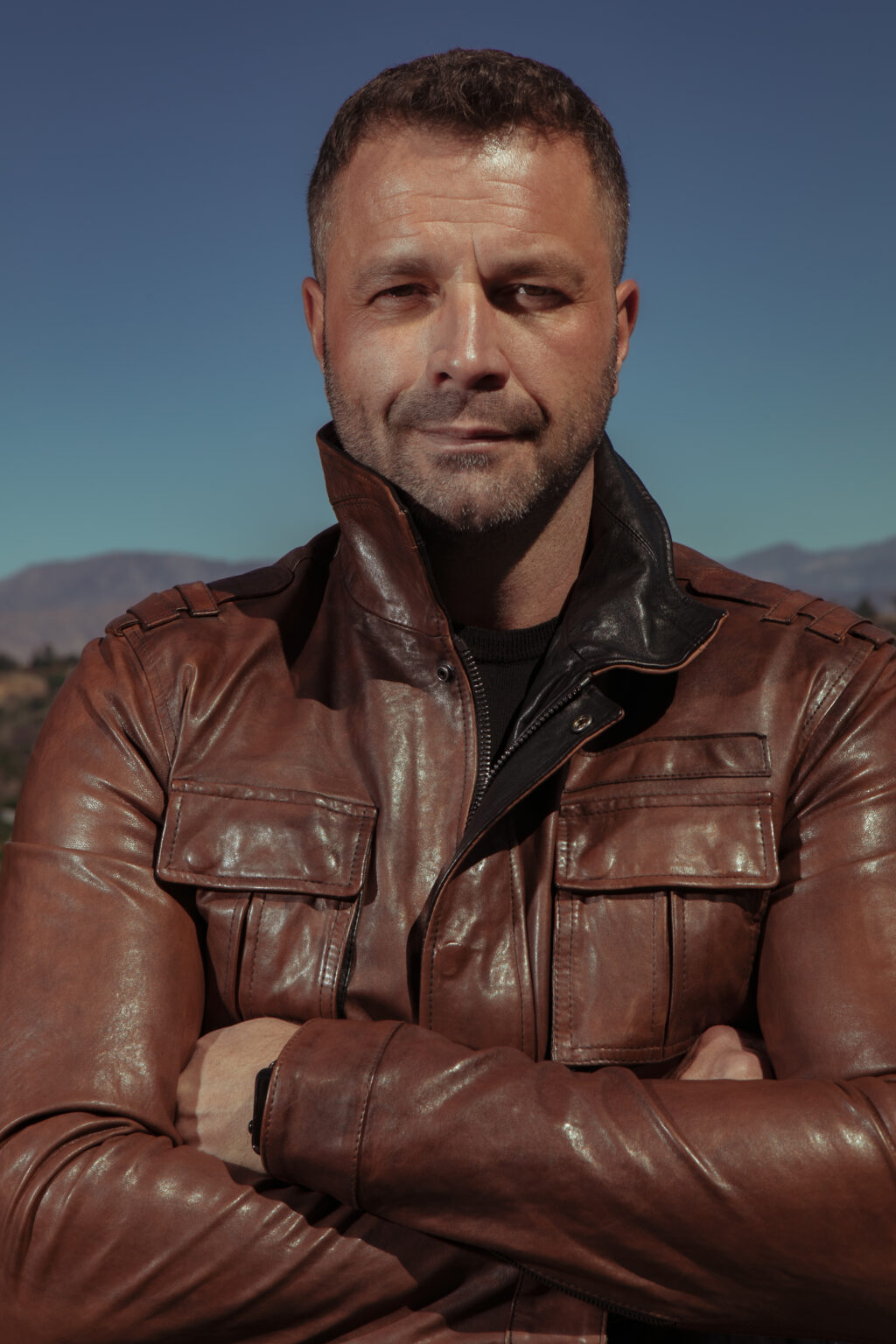Photographer VIKTORIJA PASHUTA @viktorija_pashuta
Stylist JESSE J @jessejcollections @sixkla
Stylist’s Assistant MCKEILAH BETH
Words by KIMBERLY HADDAD
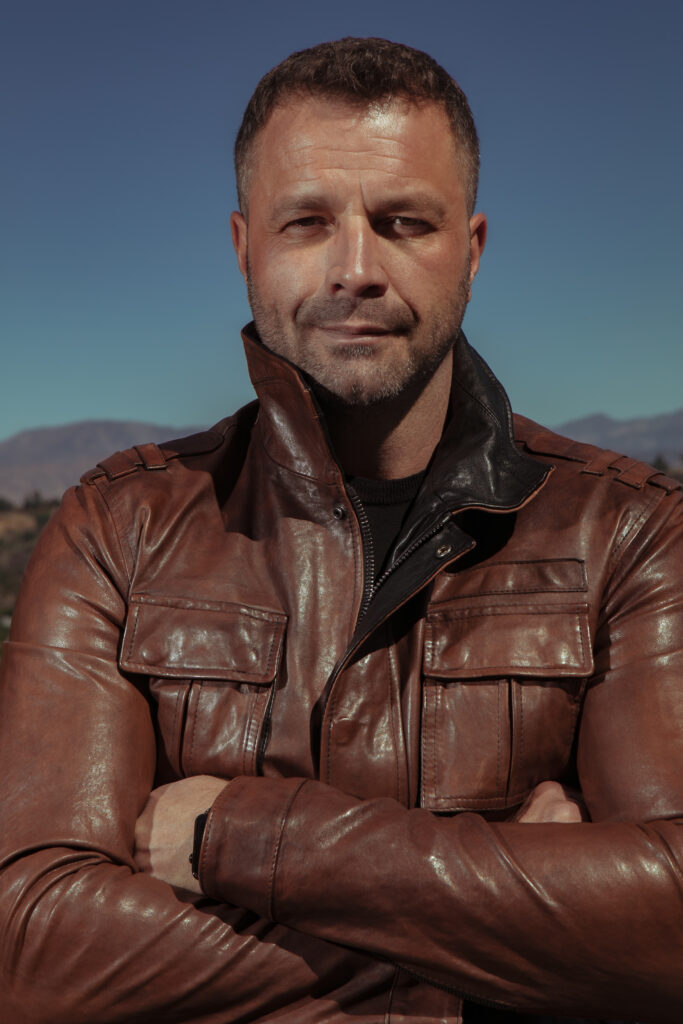
BASIC: You have quite an eclectic background of experiences, from serving in the private security sector to counter terrorism training, martial arts, and fighting human trafficking. You are the epitome of a real-life James Bond. Talk to me about your upbringing and childhood in South Africa.
TONY SCHIENA: I grew up in a small town outside of Johannesburg. It was a small, unexciting town really. It was unexciting to me, but it could be exciting to anyone looking in from the outside. It was a very conflicted society. When I went into college, I studied international trade and law because I wanted to be international and get out of deepest, darkest Africa. I wanted to go on an adventure and while I was studying I was recruited out of college into the intelligence community. I was thrown into the deep end and worked in a very tumultuous time in the history of South Africa. There was the abandonment of a really bad system and segregation. I served in whatever tiny capacity I could—as it was my initial entry into the intelligence community—in helping to create a smooth change of government and avert a potential coup. There was also a lot of domestic terrorism happening that was instigated by the left and right wing. I became very familiar with terrorism as well as the pitfalls of the intelligence industry when it comes to smoke and mirrors and disloyalty. I kind of had this trial by fire from day one.
BASIC: Do you remember the way your body and mind felt during one of your very first operations?
TONY SCHIENA: I was a young kid. I was only 19 and ignorant to potential danger. I could accomplish all kinds of things because I didn’t yet have that point of reference. I didn’t quite under- stand just how dangerous the situations could be if something went wrong. When you don’t have that point of reference and you don’t truly understand the circumstances of what could go wrong, you go through it with a lot more ease. And that was kind of my situation.
BASIC: What in your personal life has influenced your professional pursuits and helped shape you into the multi-dimensional man you have become today?
TONY SCHIENA: I never actually thought I would end up in this line of work. I did want to get the hell out of Africa and go on an adventure, and I thought studying international law would be the answer to that, but I didn’t realize there was a much more interesting angle. When I was recruited into the intelligence industry, I sort of got the answer I was searching for. When asked if that was a good thing or bad thing, I thought, could I picture myself sitting in a legal office doing contracts? Hell no. International trade? Maybe, but it would probably not have been anywhere near as exciting as the journey I have taken and am still on.
BASIC: You run your current security operations agency MOSAIC in both the US and the UK, and recently opened a branch in Hong Kong. Talk to me about this endeavor and what it entails.
TONY SCHIENA: It’s quite exciting to see where the company I started is going. I have had other companies in the past, but this one is different. I am sitting in my operations office right now, actually. It’s in Manhattan, New York. I actually kept the office throughout Covid even though we hardly use it. I also have a counter terrorism training facility in Alpine, CA. It’s a 160-acre flat top of a mountain with a private air strip and there we have a full military base with like 200 M4s and .50 caliber weapons for training. I have an office and training facility outside of the city of Zürich. The facility is actually a castle that is privately owned by our Swiss partner, so we are allowed to shoot whatever weapons we want there. And our next office, which is opening in two weeks, is in Accra, Ghana in West Africa. Those are our current offices. Just before Covid we were supposed to open another office in Dammam, Saudi Arabia, but those plans were derailed a bit.
BASIC: What does this company mean to you and have you defined a philosophy around your brand?
TONY SCHIENA: I got into this industry because it kind of found me. My experience working NIA and CIA and others back then wasn’t the best and it left a sour taste in my mouth. The person who recruited me was my professor who was American, who I understood worked as a CIA NOC (undercover), left me out-to-dry. He kind of abandoned me, which is another story. But to have that sour taste in my mouth back when I started and then to fast forward 20 years later where I own the company and my current chief operating officer was the deputy director of counter terrorism of the CIA, it’s like everything came full circle. I think when life makes a full circle, it’s very interesting and that’s what MOSAIC is. The majority of my senior management are actually ex-CIA. I have people from the FBI, NYPD Intelligence Division, and Scotland Yard. Our Chief Security Officer, General John Holmes, was head of the British Special Forces etc., but the majority are CIA.
BASIC: What has been the most intense yet rewarding operation throughout your years of being involved in high-security work?
TONY SCHIENA: I would say the one that stands out most was one of the last times I was in a war zone. It was Kurdistan, Iraqi against ISIS. Firstly, my company works for the one percenters and governments, etc., and we don’t go into who we work for as part of security protocol, but in that war zone, I was on my own. I was imbedded with the head of Kurdish intelligence. I was on the front line with him. I got shot at by ISIS snipers. I actually have it on tape. One of the Kurds was filming the landscape when we started getting shot at. The Kurds were getting hit by chemical weapons. They were getting hit by mustard gas and dirty bombs that contained nuclear material, but the world didn’t want to hear about it. At this time, the Kurds were the only organized force on the ground fighting ISIS. The rest of the world was watching. And I had a big issue with that. I was on the phone with the Pentagon telling them they’re using these chemical weapons. I drove up five hours into the mountains to examine devices and document injuries, to interview the soldiers. But they refused to listen. So basically, in order to push the needle, I ended up going to the press and the day after I came out with it, BND German Intelligence confirmed ISIS was in fact, using chemical weapons. When that article was published, people thought I was German intelligence because I spoke German and there was a photo of me in it.
BASIC: Just fascinated here, but how many languages do you actually speak?
TONY SCHIENA: I speak four languages well. I speak English, Italian, German, and Dutch. I also speak bits of Arabic and other languages.
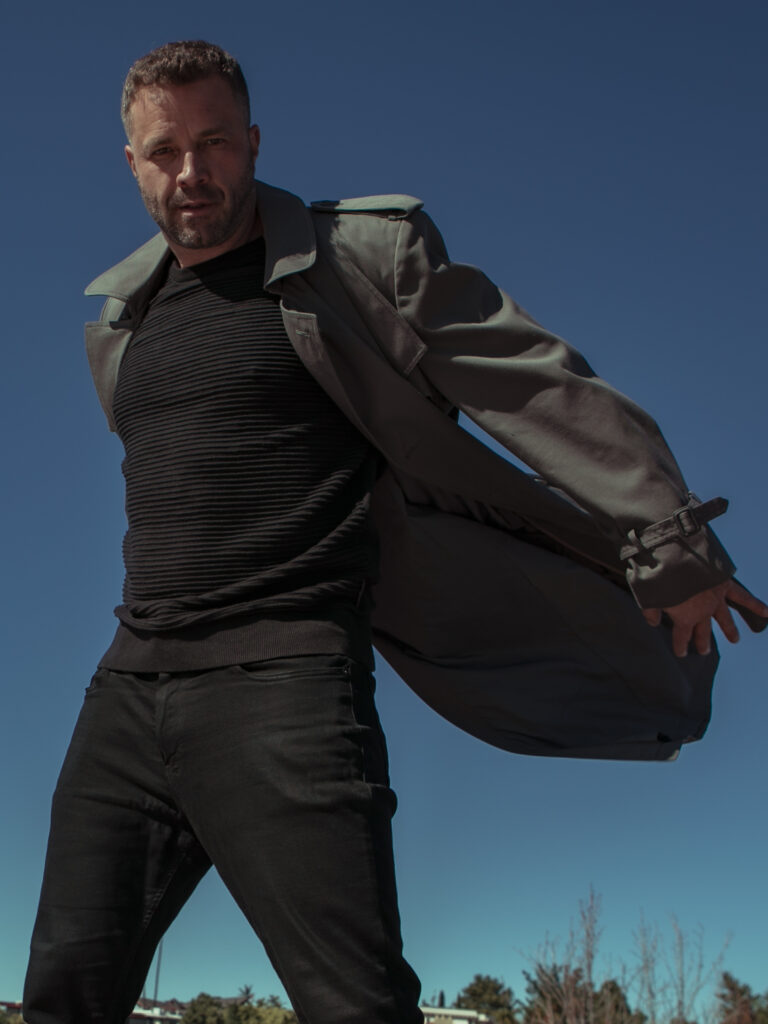
Sweater DOLCE & GABBANA @dolcegabbana
Pants BALMAIN @balmain
BASIC: Really? I can’t speak Arabic, but I can understand it very well. My family is from Jordan. TONY SCHIENA: Oh! From Jordan? Oh my God, habibti! (The word habibti is an Arabic word of endearment meaning beloved one, sweetheart, or my love.) So, Prince Ali is actually a friend of mine. Let me tell you a story about him that you might appreciate. While I was with the Kurds getting hit with chemical weapons, they didn’t even have any gas masks to protect themselves. I ended up going to Prince Ali, who spoke to his brother King Abdullah, and got gas masks deployed to the Kurds. And then I spent an entire night on the phone with experts trying to figure out how to fortify front line basis against chemical weapons.
BASIC: That is really incredible. Thank you for sharing this story with me. As I am learning more about the intense nature of your work, I am curious how it has changed your mentality and way of living.
TONY SCHIENA: There are definitely negatives to it. You become suspicious of everyone and everything. You become suspicious of every narrative, everything you see and hear in the news, the things people say. Everyone is their own representative and has their own agenda, and that becomes a bit of a hindrance. Coming from an intelligence background, it’s all about forging relationships and sometimes that translates into the real world. You tend to automatically show people what you want them to see about who you are. You are able to make friends with anyone. It becomes this automatic scenario.
BASIC: What skills learned as a highly-trained covert operative have translated into your daily life?
TONY SCHIENA: I think it goes back to what I said about forging relationships and connections with people becoming automatic. I can become friends with anyone and get into any place. From a physical standpoint, you learn how to protect yourself and others, of course. You learn to be very alert and aware of suspicious activity and articles, you walk around in what we term, condition yellow (alert and aware). You can see right through bullshit narratives in the news and the way things are manipulated.
BASIC: Have you ever felt enlightened by an event in the past that has given you a new perspective on life?
TONY SCHIENA: Wow, an event that has given me a new perspective on life? You know, there are probably a thousand examples, but there’s one that comes to mind. I studied different religions because I think that’s an important way to understand people geographically. At one stage I got really interested in Sufism, a form of mysticism in Islam. During that process I spent time in one of the communes up in the mountains of Turkey and we dressed as them, ate off the land, and slept with a bunch of people in a mosque. I was there for a while and one night, A Sufi from Kuwait came and sat next to me and whispered, “You’re not here for what you are saying you are here for.” I sort of just brushed it off, but the next day, we heard these sirens from afar and they were coming closer. All of these followers or disciples started coming out of the commune. A police escort and a guy got out of the car and walked towards the entrance where I was standing dressed in their garbs. I looked up and said, “Hello Mr. President.” It was President Musharraf from Pakistan, a friend of mine. I was advising him before he went back to Pakistan because they wanted to arrest him for treason, blame him for the murder of President Bhutto, the former president. It was all BS fabrication. He is a really good man and a friend. The Taliban tried to kill him numerous times. Anyway, I went up with him to see who can be termed the “Pope of the Sufi’s”. His name was Sheik Nazim, who has since passed away. God bless his soul. It was only because of him, the President, that I could go see him because he was ill. Even an ambassador from Malaysia who was waiting there was unable to see him. I got to spend time with him and that was enlightening from a sort of basic level where my work intertwined with my passion and learning of a different religion. My eyes were also open to Sufism and that community. You know, sometimes these things are demonized until you understand them and get to know the people. I’ve been fortunate to meet many incredible religious and spiritual leaders. I attend a conference once a year in the inner sanctum of the Vatican with the Pope and some of the most known Buddhist leaders, including the Dalai Lama in India. Last year, during an operation in the Ukraine and Croatia, I ended up seeing my good friend Brazo “The Gazer,” a spiritual healer in Zagreb. I get around and I think its important to understand different cultures and societies.
BASIC: Being an undefeated World Heavyweight Karate Champion, you are consistently enhancing your defensive tactics arsenal. What led you into the world of karate?
TONY SCHIENA: My most treasured photograph is the one of my father, brother, and sister in karate uniforms in a karate pose. I was born into a family of martial artists. My older sister was a champion and she actually really excelled at it. All I wanted to do was karate and in South Africa, I grew up in a society where our world was kind of contained and didn’t really have any other martial arts like Jiu Jitsu, Taekwondo, or Tai Chi. It was Japanese karate and everyone did it—the bouncers, the body- guards, the criminals, cops. It was the martial arts to do and I wanted to be the champion in that. Even in school, I did what was necessary—I played rugby and soccer—but I always wanted to just get home and train or go to the dojo. Then, when I was 25 or 26, I was able to achieve the world champion goal. The next year, I had a bad accident and broke both of my ankles which pulled me out of competing. I competed once more after that and my nose was broken, but I didn’t lose. I retired after that because I felt I did what I needed to do and I had a lot more to do than compete.
BASIC: What has been the biggest lesson you have learned throughout this journey?
TONY SCHIENA: Karate is essential in the upbringing of children. Traditional Japanese karate instils certain principles in people and those principles become mantras that are recited at the end of every class. They help to achieve character, sincerity, effort, education, and self-control. They are presets to live by and when they are fostered by children from the very beginning, I believe they can foster good people. It’s integral.
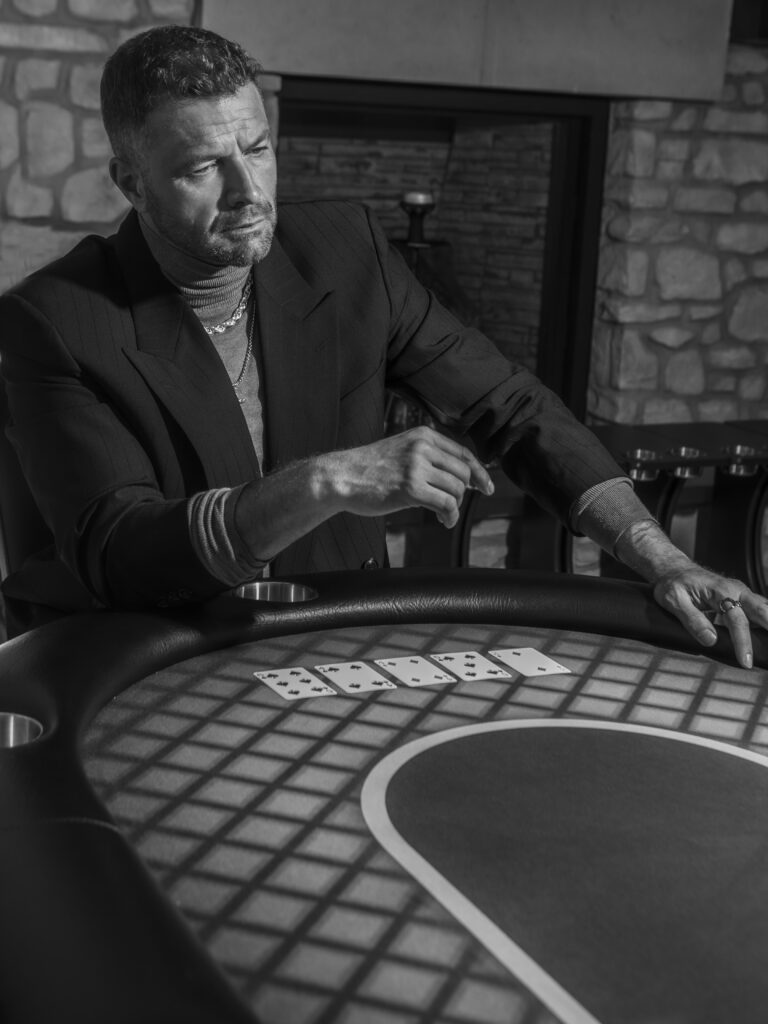
Turtle Neck DIOR @dior
Jewelry ANDROHMEDA JEWELRY
@androhmedajewelry
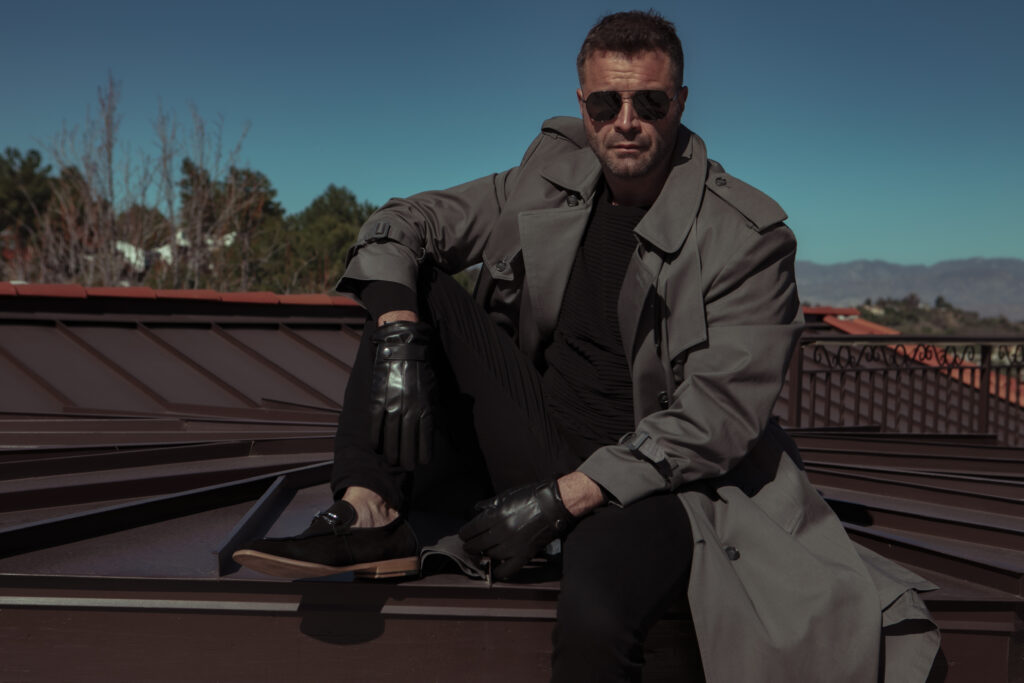
Sweater DOLCE & GABBANA @dolcegabbana
Pants BALMAIN @balmain
Gloves THE TREND HAUS
@thetrendhaus
Shoes PRADA @prada
BASIC: You got your start in the film industry with a role in William Shakespeare’s Merchant of Venice and quickly gained momentum with your stellar action skills and the ability to execute your own stunts. Have you had any near-death experiences?
TONY SCHIENA: In the film industry? No. That’s a hobby, a passion for me. I don’t see any real significant danger in that. Yes, stunt guys do put themselves in dangerous situations, but when my point of reference is my business in crisis management, then really, Hollywood is pretty tame. Merchant of Venice was my first movie and I don’t even know how the hell that happened, but to tell you the truth, it’s not something that excites me. It’s not me. I like doing action. I try to do one new Hollywood thing a year, if I’m lucky. That’s like a vacation for me. It’s Tony time, you know? It’s fun. But they put me in this TV series and there’s so much dialogue. The writer creates these scenes that are seven, eight pages long of dialogue for me and I’m like, what the hell? Can you just give me a damn fight scene? Haha. But it’s getting tougher to fit it in. I was offered the lead in a movie about a month ago and I excitedly accepted, but I had to pull out because my business is just too busy at the moment. I made a deal with myself: this is my work and films are a passion, so I need to stick to priorities (one of the precepts of karate *wink).
BASIC: You served as both a writer and actor in the film Darc, a story about the global human trafficking ring. What was it like working on this film, especially being a film created around a subject you are passionate about.
TONY SCHIENA: This was the only movie I ever wanted to make and I wrote it about 12 or 13 years ago. I wrote it—the only thing I ever wrote—produced it, and starred in it. It’s becoming a cult type of movie. I did my own stunts of course, because there is joy in that. I don’t want to just walk and talk. I want to be jumping and diving and kicking through windows. It’s organic for me. Anyway, I wanted to create a smart movie, not this in-your-face-pushing-human-trafficking-down-someone’s-throat kind of film. That’s a different angle. Darc as a character is a product of human trafficking. There’s a scene in the beginning where the kid is reading the graphic novel Darc while his mother is being abused in a brothel and that’s his escapism. It’s his way out of that environment and he becomes a piece of it—this strong fighter, killer, protector. I think that is the beauty of movies. I see it for that because I come from a small town in Africa and I think about what my escapism was. For me, it was watching movies, any martial arts movies I could get my hands on. I would watch them a thousand times. The Karate Kid was a life changing movie for me to watch. Did I want to become the actor? No. I wanted to become the character, and I think that is what most children want. They watch Spider-Man and want to be Spider-Man, not Tobey Maguire. That escapism is the power of movies.
BASIC: Do you plan to explore future writing and/or producing work in the near future?
TONY SCHIENA: Writing is a process I just don’t have time for. I have so little time. I have assistants and office managers, but I still can’t get to it. My office knows if they send me an email, I am only going to read the top sentence and the bottom sentence. Like, leave me a voicemail and tell me what’s in the email because I simply don’t have time to read it. For me to write something? Maybe years from now when I have more time. It’s like shooting. How often do I get to shoot? Luckily, last weekend in LA, I went to a friend’s ranch and he had a bunch of AR-15 rifles and that was the first time I shot in a long time. Time really is my biggest constraint right now.
BASIC: You know, I’m 5 foot 1 on a good day and the very first gun I shot was an AR-15.
TONY SCHIENA: I like it! Not a bad way to start.
BASIC: Are there any upcoming projects in the works you can share?
TONY SCHIENA: I am still shooting that TV series called Paper Empire, but I keep thinking about my film Darc and how it’s built such a cult-like following. I would like to do a sequel or a prequel. I may not call it Darc, just because of some legal issues surrounding it, but it will be in the same vein. I kind of feel like I want to make that happen, but again, I am just really struggling to find the time. I could hire writers and producers and direct them, but even that takes energy. My company MOSAIC is expanding like crazy so that’s a priority. Even our charity against human trafficking is a big undertaking. We are doing what we can, but it’s just hard to manage it all.
BASIC: What is the biggest misconception people have about you?
TONY SCHIENA: That I am unapproachable.
BASIC: Where is the most fascinating place you have traveled?
TONY SCHIENA: Exactly a week ago, I was diving in the Galapagos surrounded by dolphins, sea lions, sharks, and giant turtles.
BASIC: If you could change one aspect of our society through your work, what would it be?
TONY SCHIENA: Hopefully, truth. Having unmanipulated truth. We are in this information war of misinformation and disinformation. Everything you read should be questioned and you need to think critically, to understand manipulation and try not to become its victim.
BASIC: What is your biggest fear?
TONY SCHIENA: Biological chemical weapons. My company released a book in March 2020 titled Surviving Epidemics and Bioterrorism.
BASIC: If you only had 24 hours to live how would you spend your day?
TONY SCHIENA: Wow. I think I am lucky because I live a pretty adventurous life, so I would spend it with my family in Italy.
BASIC: When do you feel most energized?
TONY SCHIENA: When I have a lot going on. At the moment, it’s too much, but when I have a lot going on in my business and a bit of entertainment, I’m happiest. I mean I was doing security meetings the morning of my shoot for BASIC. I’ve gone from a war zone to listening to Andrea Bocelli singing in his backyard. I love that diversity.
BASIC: If you and I were to trade places, tell me one thing about yourself that I should know.
TONY SCHIENA: I eat steak very well done. I butterfly it and then I burn it.
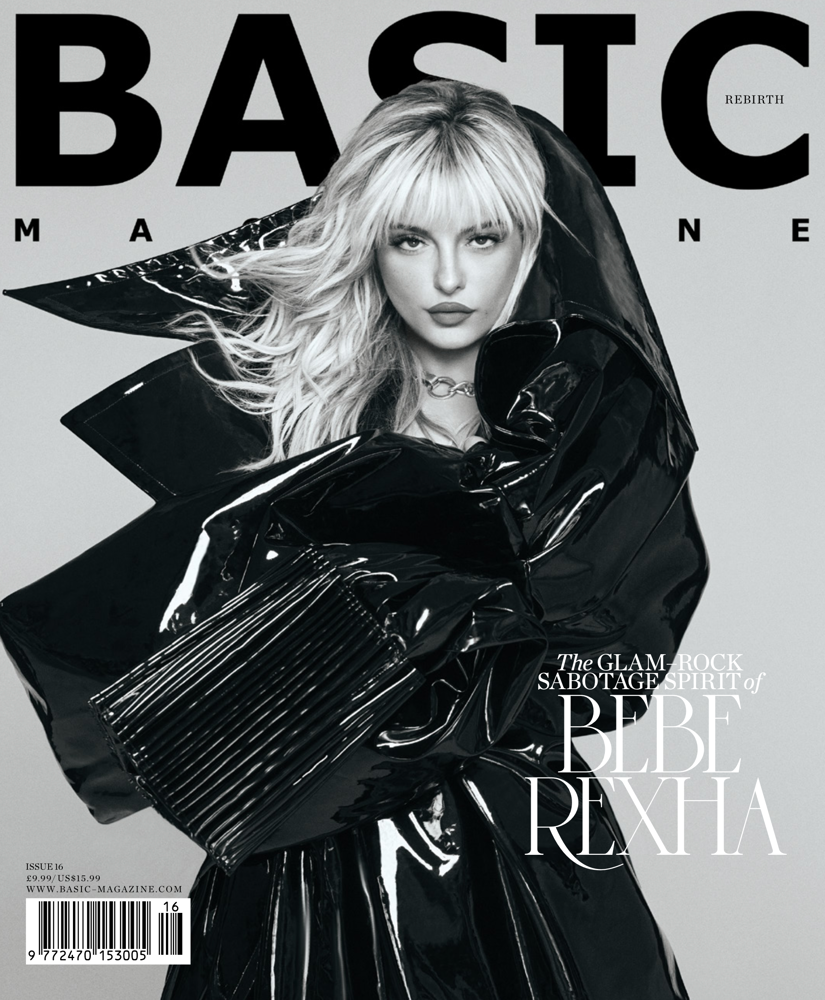
You may also like
-
Staying Loud, Staying True: Spacey Jane’s Evolution from Perth to the World
-
Reframing Narratives with KATHERINE FLYNN
-
FIGHT TO THE OTHER SIDE: Hilary Roberts on Suffering, Freedom, and Sharing her Mafia Gifts
-
SEXY 4EVER – An Interview with INJI
-
BREAKING BREAD with GAVIN ROSSDALE: A Conversation about Music, Food, and the Art of Hospitality
-
UNCOVERED: The Liberation of MODEL ROZ
